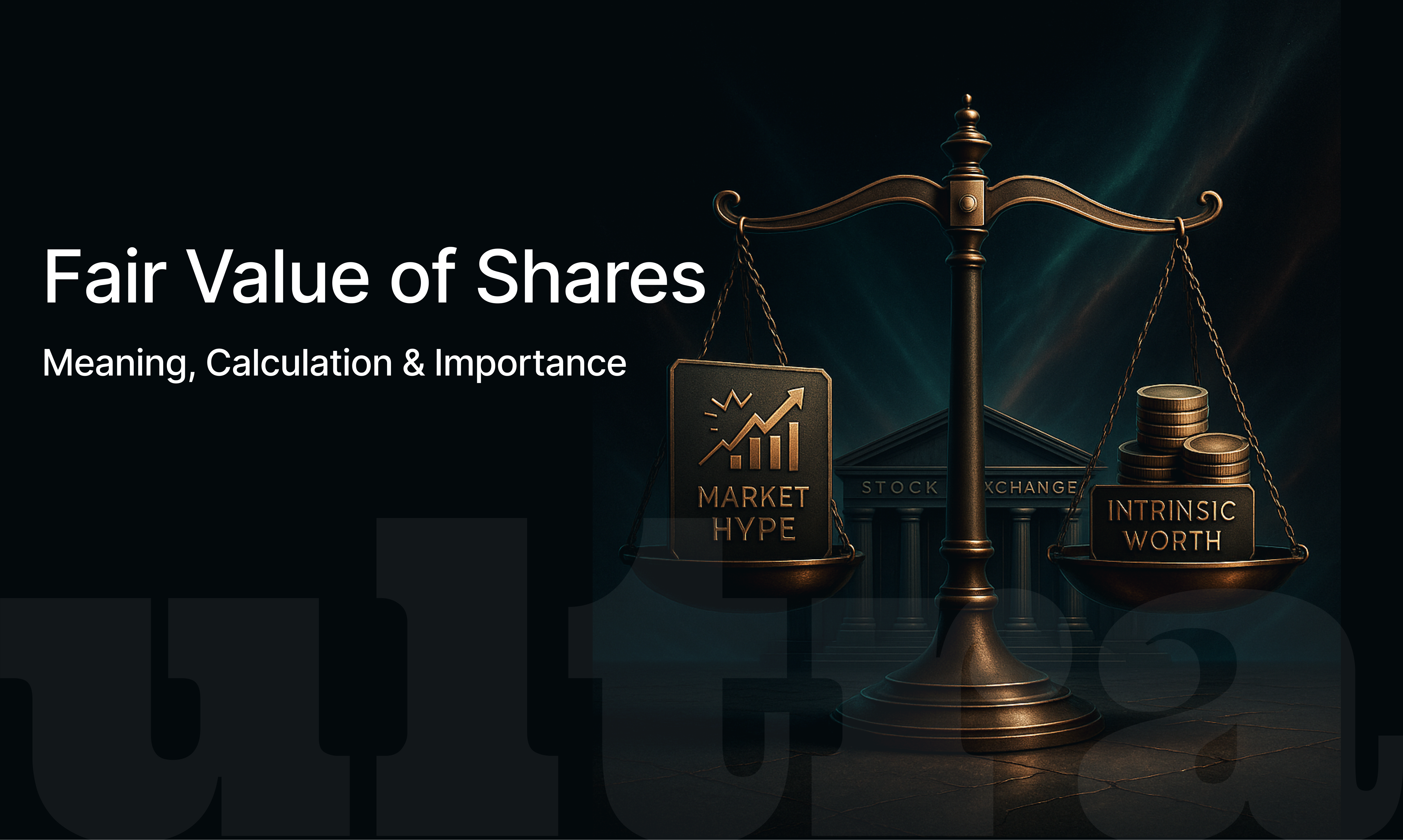Fair Value of Shares: Meaning, Calculation & Importance
18 August 2025 · Sachin Gadekar
A complete guide to understanding fair market value, calculation methods, and its significance for investors and traders.

What is Fair Value?
Investors often wonder whether a stock is overpriced, underpriced, or trading at its “true” worth. This is where the fair value of shares becomes essential. Understanding fair market value meaning, calculation methods, and its role in trading can help investors make informed decisions.
In this article, we’ll break down what fair value is, how it’s calculated for listed and unlisted shares, and its significance in both investing and trading.
Fair value is the estimated worth of a company’s share based on objective factors like earnings, growth potential, market conditions, and financial performance. It’s essentially the “intrinsic value” that helps determine whether a stock is undervalued, overvalued, or fairly priced.
The fair market value meaning refers to the price at which a willing buyer and a willing seller would trade the stock in an open market without external pressures.
Why Fair Value Matters to Investors and Traders
Fair value plays a critical role for both long-term investors and short-term traders:
For Investors: It helps in identifying undervalued stocks for long-term gains.
For Traders: It guides entry and exit points based on fair value gaps and market sentiment.
For Analysts: It aids in stock valuation models and financial reporting.
When a stock trades below its fair value, it may signal a buying opportunity; when it trades above, it may indicate potential overpricing.
Fair Value Gap and Trading Strategies:
In trading, a fair value gap is the difference between the market price of a stock and its calculated fair value. It often occurs due to market inefficiencies, news events, or investor sentiment.
Traders use concepts like:
Fair Value Gap and Order Block: Order blocks are areas where institutional buying or selling took place, often leaving behind price imbalances (fair value gaps).
Gap Trading Strategy: Buying undervalued stocks or shorting overvalued ones to capitalize on the gap.
By understanding these concepts, traders can align their technical analysis with fundamental valuation.
Methods of Fair Value Calculation
1. Discounted Cash Flow (DCF) Method
This approach estimates a company’s value based on its expected future cash flows, discounted to present value.
Formula:
Fair Value= Fair Value=(1+r)1CF1+(1+r)2CF2+...+(1+r)nCFn
Where:
CFCFCF = Cash Flow in a given year
rrr = Discount rate
2. Price-to-Earnings (P/E) Ratio Method
This method compares the company’s P/E ratio with the industry average to estimate fair value.
Fair Value=EPS×Industry Average P/E
3. Net Asset Value (NAV) Method
This calculates the fair value based on total assets minus liabilities, divided by the number of shares.
4. Fair Value Method for Unlisted Shares
For how to calculate fair value of unlisted shares, valuation often uses the Net Asset Method or the Earnings Capitalization Method, as market prices are unavailable.
Common Methods for Fair Value Calculation
| Method | Description | Best Used For |
|---|---|---|
| Discounted Cash Flow (DCF) | Values a company based on projected future cash flows discounted to present value. | Companies with predictable cash flows. |
| P/E Ratio Comparison | Uses industry average P/E to estimate share price. | Listed companies with stable earnings. |
| Net Asset Value (NAV) | Values a company based on assets minus liabilities per share. | Asset-heavy businesses. |
| Earnings Capitalization | Values based on capitalizing maintainable earnings. | Unlisted companies. |
How to Find Fair Value of a Stock
To determine the fair value:
Collect financial data – revenue, profit, EPS, cash flows.
Select a valuation method – DCF, P/E, NAV, etc.
Calculate intrinsic value based on chosen model.
Compare with market price – if market price is lower, the stock may be undervalued.
Example: Calculating Fair Value of a Stock
Let’s say a company has:
EPS = ₹20
Industry Average P/E = 15
Fair Value = 20 × 15 = ₹300 per share
If the current market price is ₹250, it’s trading below fair value, indicating a potential buying opportunity.
Risks in Using Fair Value
Market prices can remain disconnected from fair value for long periods.
Valuation is based on assumptions that may change.
Sudden economic or company-specific events can invalidate calculations.
How Ultra Helps You Invest in Fairly Priced Assets
At Ultra, we understand the importance of valuation in investment decisions. Our platform offers multiple investment opportunities including:
Bonds & fixed-income products
Alternative assets
Digital gold and silver investments
By diversifying with Ultra, you can choose assets that align with your valuation insights, making your portfolio stronger and more balanced.
Explore Ultra’s investment opportunities today and start building a portfolio backed by smart valuation strategies.
FAQs
1. What is the fair market value meaning in stocks?
It’s the price at which a stock would trade in an open market between a willing buyer and seller without pressure.
2. How to calculate fair value of stock?
Use valuation models like DCF, P/E ratio comparison, or NAV method based on available data.
3. What is a fair value gap in trading?
It’s the difference between a stock’s calculated fair value and its market price.
4. How to calculate fair value of unlisted shares?
Use methods like the Net Asset Value method or Earnings Capitalization, as no market prices are available.
5. Can Ultra help me invest in fairly valued assets?
Yes, Ultra offers diversified investment options including digital gold, silver, and other fixed-income products.